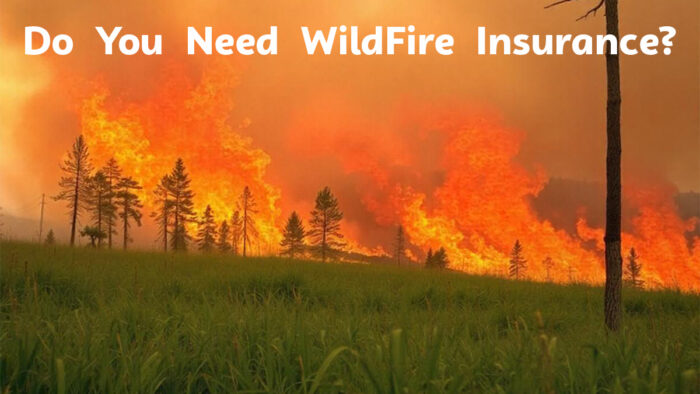Yes, you need to include wildfire insurance coverage in your homeowners or renters policy. With wildfires becoming more common and severe, wildfire insurance isn’t just about protecting your property; it is mostly about protecting your peace of mind.

Losing everything you’ve built in just a few hours is a real risk, and without wildfire insurance, starting over could be daunting.
While your existing homeowners or renters insurance often covers wildfire damage, knowing exactly what your policy contains is very important. Here’s how you can make sure your home, your family, and yourself are ready for wildfires.
What is Wildfire Insurance?
Most standard homeowners insurance policies include coverage for wildfires, but with increasing wildfire risks, some insurers are raising premiums, cutting back on coverage, or even dropping policies in high-risk areas.
To ensure you’re protected, it’s crucial to check your policy details. Check what the policy covers and what it does not to confirm wildfire protection.
Typically, home insurance covers:
- Damage to your home’s structure
- Detached structures like garages or sheds
- Personal belongings
- Landscaping
- Debris removal
- Building code upgrades (if included)
- Living expenses if you need to relocate
You need to always be aware that some policies might not cover landscaping or detached buildings.
When Does Homeowners Insurance Not Cover Wildfire Damage?
There are times when homeowners insurance might not cover wildfire damage:
- High-risk areas: If you live in a high-risk wildfire zone, insurers might be reluctant to cover you or may charge higher premiums. In some cases, they might not offer policies in these areas at all.
- Policy exclusions: Some homeowners insurance policies specifically exclude wildfire damage. The details can vary by insurer and policy.
- Insufficient coverage: Even if your policy covers wildfire damage, it might not fully cover the cost to rebuild or repair your home. Check that your coverage matches the replacement cost of your home.
If finding homeowners insurance is difficult due to high wildfire risk, consider looking into state-run programs like FAIR plans. Available in 30 states, these plans help homeowners in risky areas get insurance when traditional options aren’t available.
Does Renters Insurance Cover Damage Caused by Wildfires?
When wildfires strike, your landlord’s insurance usually covers the building but not your personal belongings. That’s where renters insurance steps in.
Renters insurance helps protect your stuff like furniture, electronics, and clothes from damage or loss due to wildfires. It also often includes liability coverage, which can help with medical or legal costs if someone is injured on your rented property because of the wildfire.
Where Can You Get Wildfire Insurance?
There isn’t a separate “wildfire insurance policy” available. Wildfire coverage is usually included in a standard homeowners insurance policy. Since the specifics can vary, it’s important to check your policy to understand what’s covered and any limitations.
If you’re unsure or want to make sure you’re fully protected, talking to your insurance provider is a good idea. They can give you the most accurate and tailored information about your coverage options.
However, if your home insurance doesn’t cover wildfires, check if you can add it to your existing policy. If you’re in a high-risk area and can’t get coverage, consider a FAIR plan. FAIR stands for Fair Access to Insurance Requirements and is a state-run program designed to help people in high-risk zones.
In some areas hit hard by wildfires, insurers might cancel policies, but state insurance commissioners sometimes pause these cancellations for up to a year after a wildfire. If your policy is canceled, you can appeal the decision.
You can also get in touch with your state’s insurance commissioner for help. Be sure to have before-and-after photos of your property and receipts for any work done to protect your home from wildfires. If your insurer cancels your policy, you might look into getting coverage from an out-of-state insurer, which can be significantly more expensive.
How Are Claims Settled in a Wildfire Insurance Case?
To file and settle a wildfire insurance claim is a very easy and simple process. Here’s how insurance claims are settled after a wildfire:
- File a claim: Start by filing a claim with your insurance company as soon as possible, usually within 15 days of the fire. You’ll need to provide details like the date, location, and a description of the damage.
- Document the damage: Collect evidence of the damage by taking photos or videos, listing any lost belongings, and keeping receipts for repairs or replacements.
- Adjuster evaluation: An insurance adjuster will visit your property to assess the damage and decide how much compensation you’re eligible for.
- Settlement offer: After evaluating the damage, the adjuster will make a settlement offer based on your policy and the losses you’ve suffered. This might include costs for repairs, replacements, and temporary living expenses if you’ve been displaced.
- Negotiate if needed: If the offer doesn’t cover your losses, you can negotiate with the insurance company. Provide additional evidence if necessary and consider consulting a public adjuster or attorney for assistance.
Wildfire insurance is very important to homeowners. Ensure that the coverage is included in your policy to protect your financial security and property. If you’re unsure or want to make sure you’re fully protected, talking to your insurance provider is a good idea.



